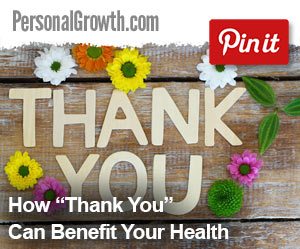

Showing your appreciation and saying “thank you” not only helps others to feel good, it is linked to numerous health benefits for you.
If that sounds too good to be true, then consider the results of a study performed by the American Psychological Association in which patients with heart disease regularly expressed gratitude and, subsequently, improved their symptoms. Whether you have heart-related complications, another illness or are healthy and looking to maintain your progress, discover these eight ways in which giving thanks strengthens your mind and body.
1. Expressing Gratitude Lowers Stress Levels
Solely focusing on the negative aspects of life easily leads to increased stress and anxiety, which in turn can affect blood pressure, heart rate and other bodily functions. Reduce your chances of experiencing stress by feeling, vocalizing and practicing gratitude on a daily basis. A simple shift in your approach to problems can greatly help you to solve them without strife.
2. Being Thankful Relieves Moodiness
Low moods, whether they occur from grief, challenging life circumstances or general cases of the blues, can be remedied through being mindful of those comforts for which you are grateful. Alleviate moodiness, which can lead to poor health practices over time, by taking a few moments to say “thank you” to supportive people and for basic necessities.
3. Saying “Thank You” Makes It Easier To Sleep At Night
Have you ever had trouble falling and staying asleep because your mind was preoccupied with ruminating on the troubles in your life? If so, try changing your default strategy by giving thanks and appreciation more often. Gratitude for your existence can help you to get regular rest and avoid health complications from insomnia and disrupted sleep cycles.
4. Thankfulness Reduces Inflammation
In the American Psychological Association study cited above, heart patients who adhered to practicing thankfulness were less likely to feel the effects of inflammatory markers that could worsen their symptoms. Apply the findings of this study to your life and see if an increase in gratitude leads to a decrease in illness influenced by inflammation.
5. Giving Thanks Promotes More Energy
High levels of mental and physical energy are highly useful when tackling daily life and one way to increase your overall energy is to view the world through a grateful lens. Treasure your ability to contribute your skills toward completing tasks, and never approach an issue with a negative mindset as this quickly saps your motivation.
6. Optimism For Life Boosts Immunity
Health researchers have found evidence across various studies that strong immunity and a robust blood cell count are found more often in optimistic, thankful people than in those with a pessimistic mindset. Help your body to maintain its natural immune system functioning by living a life of gratitude and positivity.
7. Practicing Gratitude Leads To Better Health Monitoring
Logically, if you are thankful for having the ability to live well, then you are more than willing to look after your health through receiving regular checkups, following a nutritious diet and engaging in physical activity. Appreciate your body and all it can do; taking care of yourself will naturally fall into place.
8. Appreciation Benefits Overall Wellbeing
If you adopt the habit of being grateful for all of the good in your life, even in times of hardship, then you are far more likely to maintain an overall healthy existence. Remember that your physical and mental health is important to nourish if you wish to be a productive person who approaches the world with positive energy.

